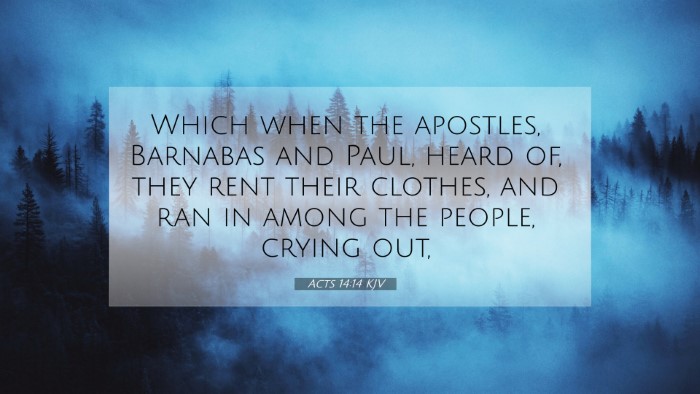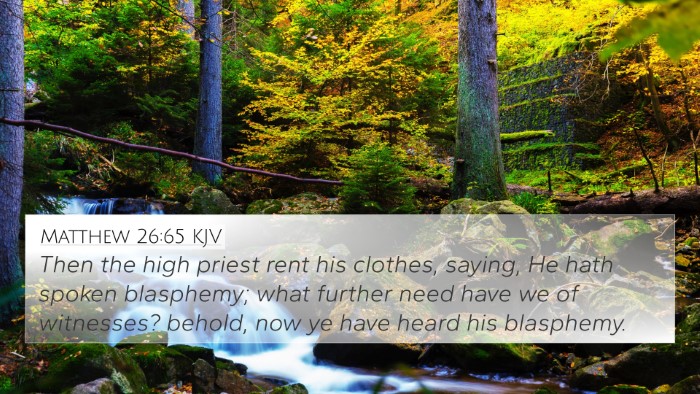Understanding Acts 14:14
Acts 14:14 states:
"But when the apostles Barnabas and Paul heard of it, they tore their clothes and ran in among the people, crying out."
Summary of Acts 14:14
This verse captures a significant moment in the ministry of Paul and Barnabas as they encountered a situation of mistaken identity. The people of Lystra had mistaken them for gods due to the miracles they had performed. Paul and Barnabas' immediate reaction of tearing their clothes was a traditional expression of grief and horror in the face of idolatry. This moment illustrates their commitment to directing the glory back to God rather than allowing themselves to be exalted.
Thematic Insights
Here are key thematic insights drawn from the commentaries:
- Rejection of Idolatry: Paul and Barnabas denounced the worship of humans, reinforcing a central theme of Christianity that emphasizes worshipping the Creator rather than the created.
- Emphasis on Humility: The act of tearing clothes symbolizes the profound humility and urgency with which the apostles sought to correct the misunderstanding.
- Apostolic Authority: Their actions exemplify the true responsibilities of apostolic leaders in guiding the flock away from false teachings and toward the gospel message.
- Miracles and Their Purpose: The miracles performed earlier were signs pointing to the truth of the gospel, not endorsements of their personal divinity.
Cross-References for Acts 14:14
Acts 14:14 is interwoven with numerous other scriptures, providing a richer understanding of the themes and messages present in the verse. Here are some relevant cross-references:
- Exodus 20:4-5: This passage warns against idolatry and the worship of graven images.
- Romans 1:25: This verse discusses the exchange of truth for a lie, relating to how humanity often worships created things rather than the Creator.
- 1 Corinthians 10:14: Paul instructs to flee from idolatry, reinforcing the message of Acts 14:14.
- Galatians 1:6-9: Emphasizes the importance of preserving the purity of the gospel message against false teachings, akin to Paul’s actions in the face of idolatry.
- 1 Thessalonians 1:9: Highlights turning from idols to serve the living God, which connects thematically to the rejection of idolatry in Acts 14:14.
- Matthew 4:10: Jesus commands worship only of God, reinforcing the biblical prohibition against idolatry.
- John 14:13: Jesus speaks about glorifying the Father through the Son, connecting to Paul and Barnabas’ intent to glorify God.
Application of Cross-Referencing
In studying Acts 14:14, cross-referencing allows believers to explore connections within the biblical narrative. Using tools for Bible cross-referencing such as a Bible concordance or a Bible cross-reference guide aids in identifying these significant links:
- Tools for Bible Cross-Referencing: Utilize techniques for identifying connections between Old and New Testament scriptures.
- Comparative Bible Verse Analysis: Engage in a comparative study of verses that highlight themes of idolatry, humility, and apostolic authority.
- Bible Chain References: Follow thematic chains that interlink scriptures to glean deeper insights into God's character and directives.
Conclusion
Acts 14:14 serves as a powerful reminder of the early church's struggle against misinterpretation and idolatry. Through the careful study and application of cross-references, believers can enhance their understanding of scripture, gaining insights into the consistent theme of glorifying God alone throughout the Bible. This commitment ensures that the focus remains on the true message of the gospel, free from the distortions of idolatry and false praise.










